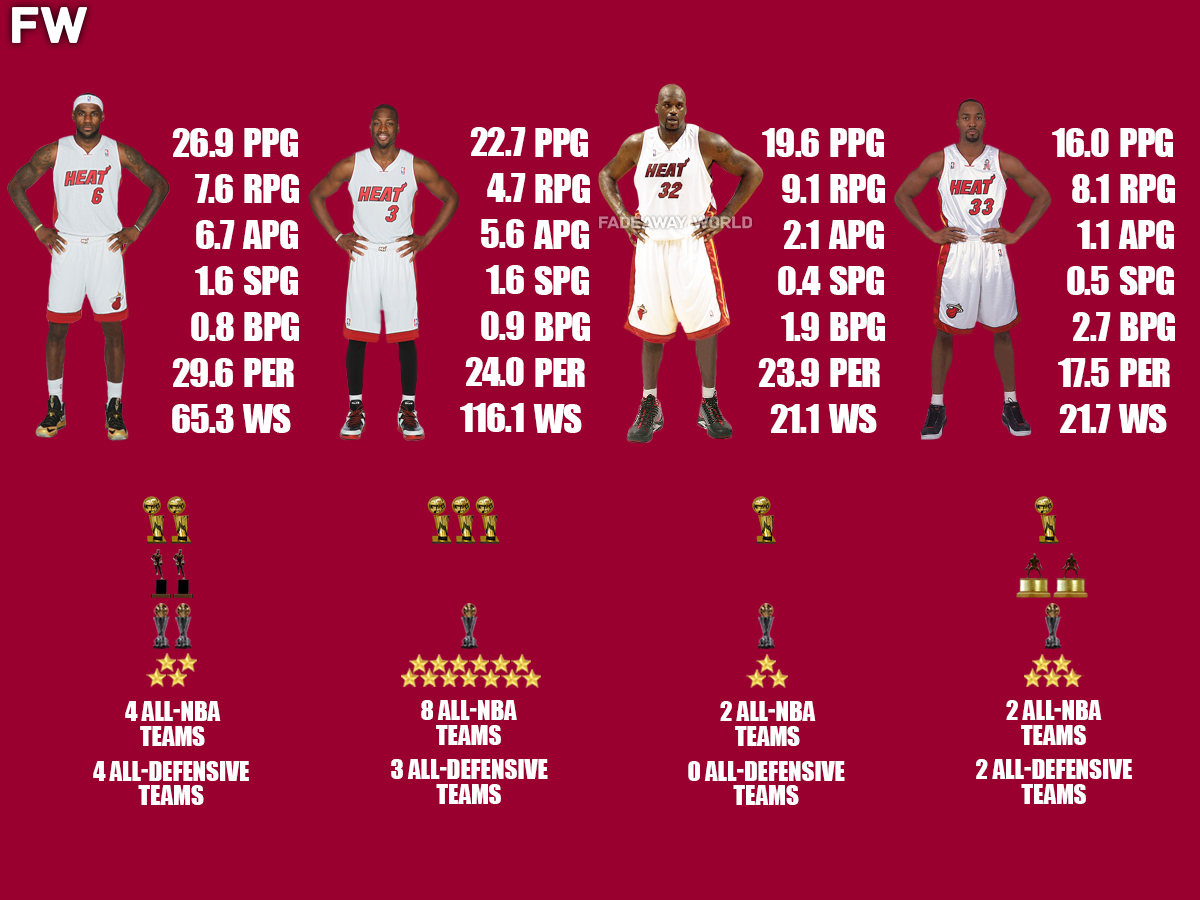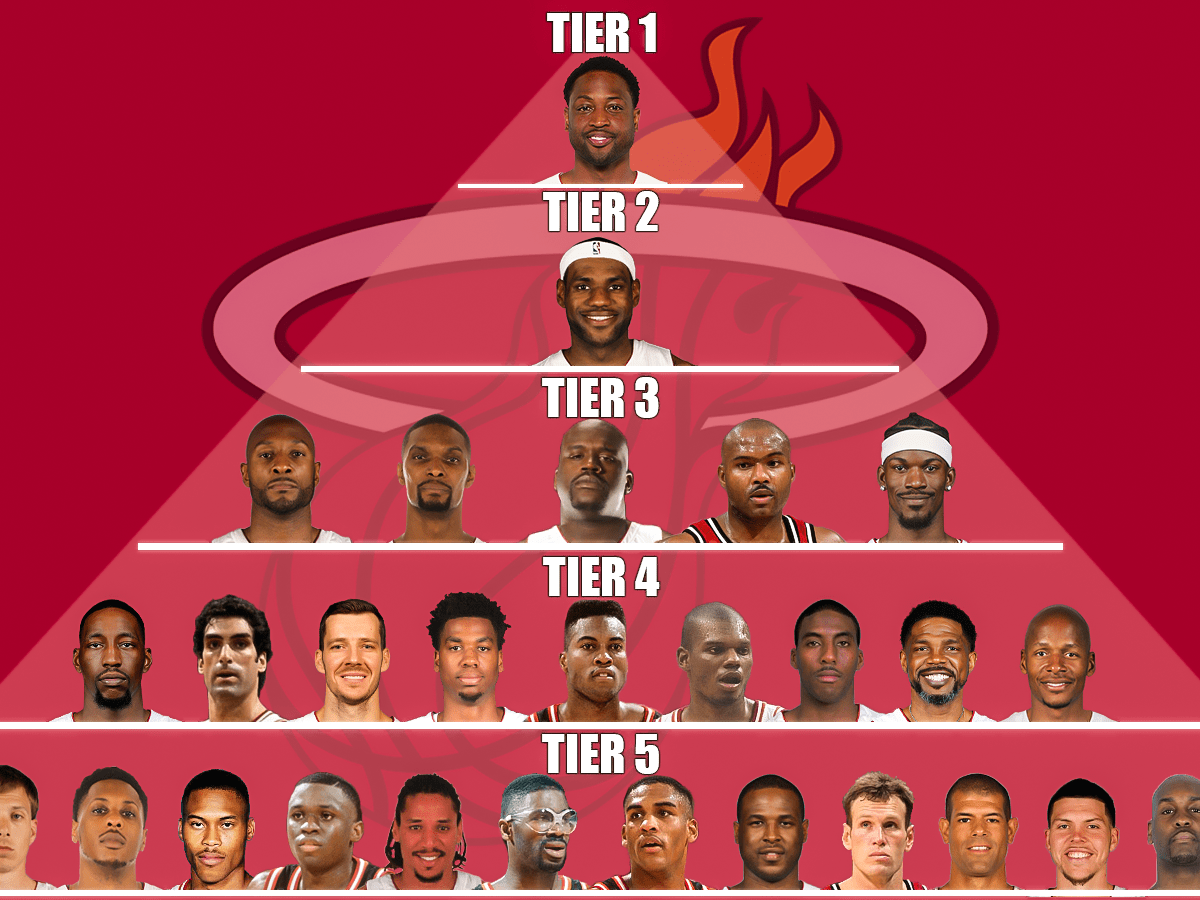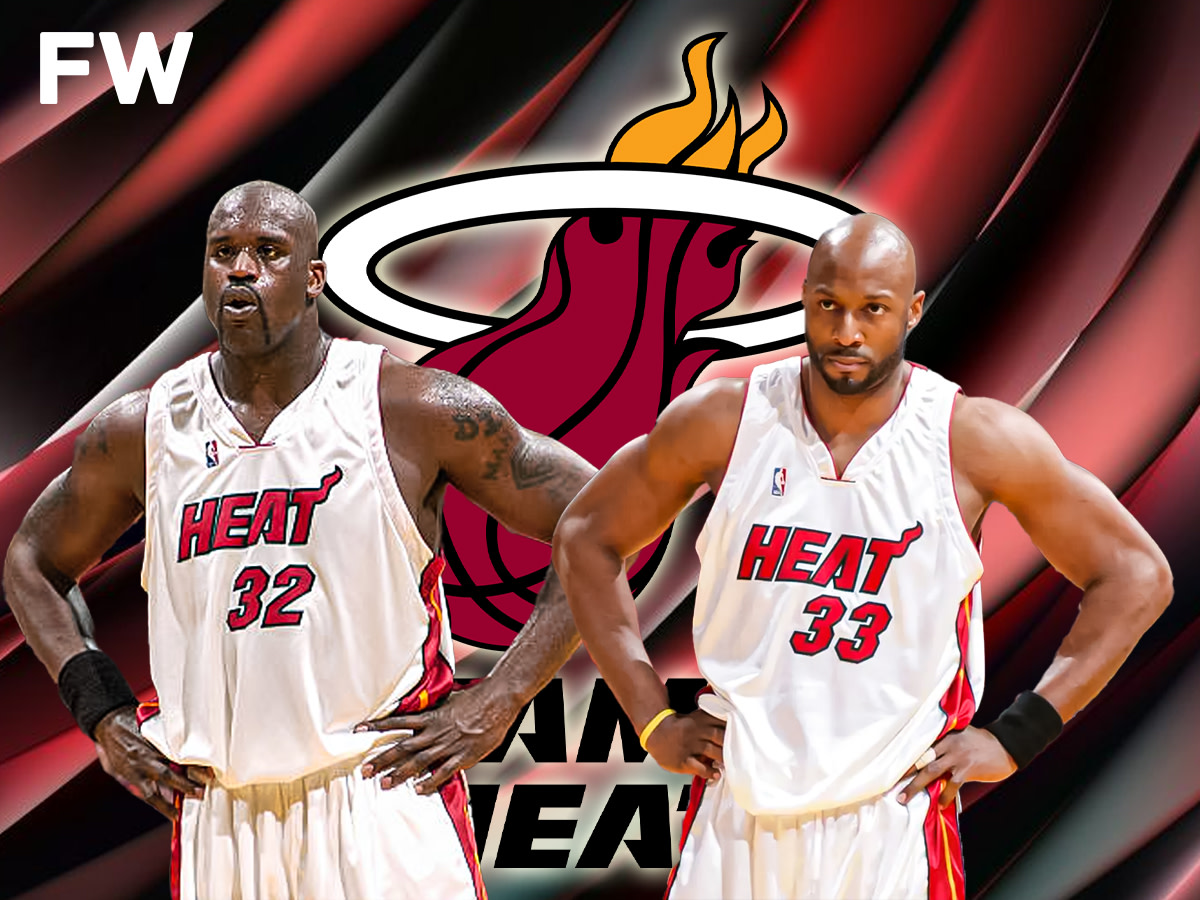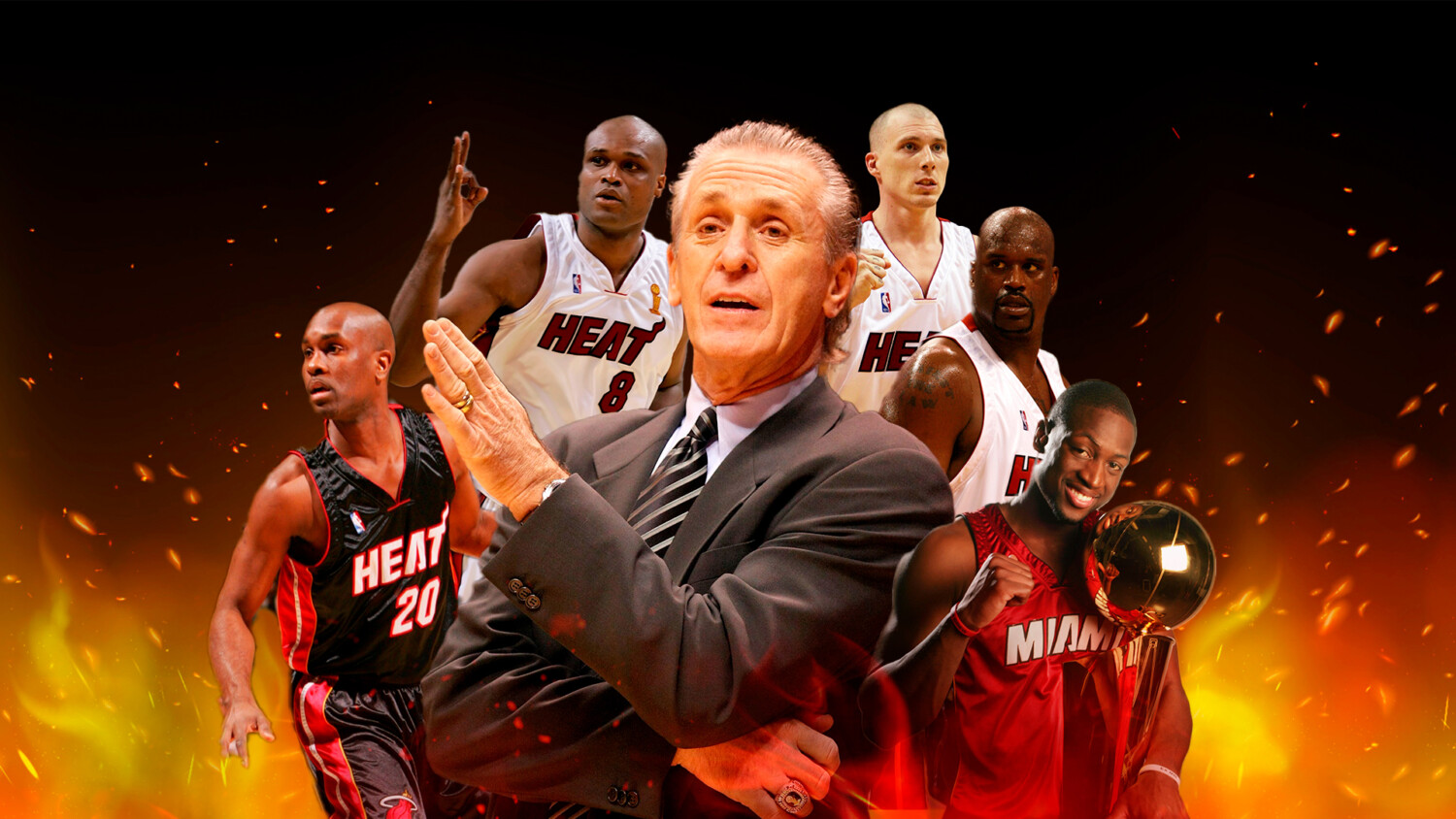In just 36 years since their founding in 1988 and their 1988–89 season debut, the Miami Heat have grown to be among the greatest teams in NBA history. Some of the greatest players of all time have contributed to the Heat’s development into a well-respected brand in the NBA, particularly in the present day. There is a dispute that these NBA luminaries bring up that we have already resolved with teams like the Lakers and the Celtics. Who is the Miami Heat’s all-time great?

The Miami Heat are undoubtedly among the most successful NBA teams of the past 20 years, having made 24 playoff appearances, seven trips to the NBA Finals, and three NBA titles. Alonzo Mourning, Shaquille O’Neal, Dwyane Wade, and LeBron James all have strong arguments to make for the crown. Jimmy Butler has also made a case for himself to be on this list, but he was narrowly excluded due to two Finals defeats and five seasons in which he was less accomplished than these four players. Out of the four, only one will make it through our most precise formula to be crowned the franchise’s greatest player.
Let’s name LeBron James, Dwyane Wade, Shaquille O’Neal, and Alonzo Mourning the Miami Heat’s franchise GOAT.
1. LeBron James: 26.9 points per game, 7.6 rebounds, 6.7 assists, 1.6 rebounds, and 0.8 rebounds (4 points)
2. Dwyane Wade: (3 points): 22.7 PPG, 4.7 RPG, 5.6 APG, 1.6 SPG, 0.9 BPG
3. Shaquille O’Neal (19.5 PPG, 9.1 RPG, 2.1 APG, 0.4 SPG, 1.9 BPG; 2 Points)
4. 16.0 PPG, 8.1 RPG, 1.1 APG, 0.5 SPG, and 2.7 BPG for Alonzo Mourning
As usual, we begin with the category for fans of box scores and players who had the best career stats while playing for the Heat. LeBron James became the franchise’s all-time leader in points per game with 269 after spending four of his best years in Miami. James easily wins his first category and four GOAT points because he also ties for the most steals per game and averages the most assists out of these four contenders.
With 15 amazing years in Miami, Dwyane Wade, the franchise’s all-time leader in nearly every category, comes in second. On this list, Wade is the only player outside James to average more than 20.0 points per game while simultaneously tying for the lead in assists and steals.
Shaq and Alonzo Mourning trail behind for two points and one point, respectively. As we all know, Mourning was the far more influential defender, but Shaq was the superior passer, rebounder, and scorer of the two. Due to mathematical calculations, Mourning only obtains one point, while O’Neal gains a tiny advantage over him with two points.

Most titles won by NBA players1. Dwyane Wade (4 points): 3 NBA Championships
2. Two NBA Championships (LeBron James; three points)
T3. Shaquille O’Neal: Two points and one NBA Championship
T3. Alonzo Mourning: Two points and one NBA Championship
Only one player has been a part of the team’s three NBA championships in its existence. As the team’s leader and main draw, Dwyane Wade assisted the Miami Heat in winning their first NBA title. As one of the greatest duos in NBA history, he went on to play as LeBron James’ backup in 2012 and 2013, helping them win back-to-back titles.
LeBron James played better than both Wade and everyone else in that duo’s 2012 and 2013 NBA championship victories. James averaged almost a triple-double and excellent defense in both series victories, earning him the title of Finals MVP on both occasions. James guided the Heat to four NBA Finals berths in four seasons, but they lost to Dallas in 2011 and San Antonio in 2014.
Before the 2004–05 season, Shaquille O’Neal left the Lakers after a stellar career in Los Angeles. O’Neal filled in as Dwyane Wade’s backup during the 2005–06 season after placing second in the MVP voting that year. For the first time in his career, O’Neal adapted to that position and assisted in leading them to a championship in 2006. Alonzo Mourning, our other GOAT contender, was also a member of the 2006 championship squad. Mourning, who was recovering from a kidney ailment and was well past his peak, was an important defensive player for them off the bench.
LeBron James has the most MVP awards, with two (4 points).
T2: Dwyane Wade (0 Points, 0 MVP Awards)
T2. Alonzo Mourning: 0 Points and 0 MVP Awards
T2. There were no MVP awards for Shaquille O’Neal (0 points).
Within the Miami Heat’s history, only one player has ever taken home the MVP award: LeBron James. James was a dominant player for the team throughout his four years there, winning MVP titles in 2012 and 2013. James averaged 26.9 points, 8.0 rebounds, 6.8 assists, and 1.8 steals per game between his two MVP seasons. In addition, he shot 39.0% from three on 2.5 tries per game and 54.9% overall from the field.
Because of other all-time great seasons, the other three came very close to winning MVP with the Heat during their heyday. In 2005, Shaquille O’Neal came in second place behind Steve Nash, while in 2009, Dwyane Wade came in barely behind Lebron James and Kobe Bryant. O’Neal, Wade, and Mourning receive zero points in this area, whereas LeBron James receives four due to the absence of MVP honors among the players on our list.

Most MVP Awards in the Finals1. LeBron James: Two MVP awards from the Finals (4 points)
2. Dwyane Wade: 1 MVP Award for the Finals (3 Points)
T3. Shaquille O’Neal: 0 MVP awards in the finals (0 points)
T3. Alonzo Mourning received zero points for MVP in the finals.
The Heat have had two players named Finals MVP in their franchise history in between their three NBA titles. LeBron James receives four points for winning MVP in both the 2012 and 2013 Finals. For his first two career titles and Finals MVP awards, James guided the Heat to victories over the Thunder in five games in 2012 and the Spurs in seven games in 2013.
Dwyane Wade played for the Heat on the NBA championship teams of 2012 and 2013. A few seasons prior to it, in 2006, Wade led Miami to its inaugural championship. Wade finished the 2006 NBA Finals with 34.7 points, 7.8 rebounds, and 2.7 steals per game to help the Miami Heat defeat the Dallas Mavericks in a six-game series.
Despite having significant and crucial roles on that 2006 championship team, Shaquille O’Neal and Alonzo Mourning were both given zero points for the category since they weren’t deemed worthy of being the Finals MVP.
Awards for Most Defensive Player of the Year: Alonzo Mourning: two awards for defensive player of the year (4 points)
T2. LeBron James received zero points for defensive player of the year.
T2. Dwyane Wade (0 points) for Defensive Player of the Year
T2. Shaquille O’Neal received zero points for defensive player of the year.
Only one of these players ever won Defensive Player of the Year while wearing a Miami Heat uniform, much like it was with the MVP award. In 1999 and 2000, Alonzo Mourning won the Defensive Player of the Year title twice in a row. At this point, Mourning has won consecutive block titles with 3.9 and 3.7 blocks per game, respectively. In those two seasons, Mourning also averaged 10.4 rebounds per game.
Of the three, LeBron James was the closest, coming in second in the 2013 Defensive Player of the Year voting. Marc Gasol’s victory in the award ceremony remains one of the most contentious in NBA history. Despite having outstanding seasons on the defensive end of the court in Miami, neither Wade nor O’Neal were considered for Defensive Player of the Year.

2. LeBron James: Four selections to the All-NBA team (3 points)
T3. Shaquille O’Neal: Two selections to the All-NBA team (2 points)
T3. Alonzo Mourning: Two selections to the All-NBA team (2 points)
This is when Dwyane Wade’s tenure with the team starts to pay off as we proceed through our process. No other player has received more than four choices for the All-NBA Team, with Wade having the most with eight. During a nine-year period from 2005 to 2013, he was selected for two first teams, three second teams, and three third teams, totaling nine All-NBA Team accolades.
Between 2011 and 2014, LeBron James spent four seasons with the Miami Heat, where he was at the pinnacle of his game. James was by far the best all-around player in the game and was named to the All-NBA First Team during his four years with the Heat. To win two points in the category, Shaquille O’Neal and Alonzo Mourning both received two selections to the All-NBA Team during their time with the Heat. Mourning was on the first team once, and O’Neal was on the first team twice.
LeBron James has the most all-defensive team selections (4 points) out of all players.
2. Dwyane Wade: Three selections to the All-Defensive Team (3 points)
3. Alonzo Mourning: Two selections to the All-Defensive team (2 points)
4. Shaquille O’Neal: 0 selections to the All-Defensive Team (0 points)

Despite his longevity advantage, Dwyane Wade is one pick away from LeBron James in this category for the All-Defensive team. With three All-Defensive First Team honors and one Second Team selection in 2014, LeBron says volumes about the defender he was at the moment. From 2011 to 2014, the Heat had their most prosperous run as a team thanks to James’ defense, which was the driving force behind four straight trips to the NBA Finals.
It’s unfortunate that Dwyane Wade was never selected more than three times as one of the NBA’s top defensive guards. Wade was a fierce defender in the 2000s and 2010s who frequently made big plays on the defensive end of the court. With three points, his three All-Defensive teams come in second place on this list.
Alonzo Mourning, who played for the Miami Heat in 1999 and 2000, was selected twice for the All-Defensive First Team. He received the Defensive Player of the Year award in those same seasons. Regarding O’Neal, other centers in the NBA had already surpassed him on that side of the ball when he joined the Heat in 2004–05, meaning that his defensive heyday had already past.
The majority of All-Star choices1. Dwyane Wade: Four points and thirteen All-Star selections
2. Alonzo Mourning: Three Points and Five All-Star Picks
3. LeBron James: Two points for four All-Star selections
4. Shaquille O’Neal: One point for three all-star selections
Dwyane Wade owns more than half of the 25 All-Star selections that the four contenders have combined for. With 13 All-Star selections across his 15 seasons with the Heat, Wade’s longevity earns him a spot in another category. Wade became the first player in franchise history to earn the All-Star MVP award in 2010 while still playing with the Heat.
Due primarily to insufficient playing time, no other player in our criteria has been selected for more than five All-Star teams during their Miami Heat careers. Alonzo Mourning earned five selections to the All-Star team over a seven-year period with the franchise, from 1996 to 2002. Despite being selected All-Stars in every season they spent with the Heat—four for James and three for Shaq—Lebron James and Chris Mourning fall short of Wade and Mourning in this regard.
/cdn.vox-cdn.com/uploads/chorus_asset/file/21923298/kram_heat_unprecedented_run_getty_ringer.jpg)
1. Dwyane Wade: 116.1 Win Shares (4 Points) Total Win Shares
2. LeBron James: 3 points (3 Win Shares)
3. Alonzo Mourning: 2 points (64.9 win shares)
4. Shaquille O’Neal: 1 point and 21.1 win shares
In the area of total win shares, longevity also triumphs, as Dwyane Wade of the Miami Heat dominates the field with 116.1 win shares during his career. Wade, one of the Heat’s all-time greats, may not have led the NBA in win shares overall, but he did lead the team all-time with five seasons of at least 11.0 and nine seasons of at least 5.0 win shares.
Considering that LeBron James amassed nearly 65.0 win shares in just four seasons, it is remarkable that he ranks second on this list in terms of overall win shares. James led the NBA in total win shares throughout his first three seasons in Miami, averaging more than 14.5 win shares every season. In 2014, he added a season with 15.9 win shares, making his total the second-highest on our list.
Again demonstrating the influence James has had in Miami, Alonzo Mourning finished second in total win shares, only 0.4 win shares behind James. During his 11 seasons with the Heat, Mourning averaged 5.9 win shares per season, totaling 64.9 win shares.
LeBron James has a PER of 29.6 (4 points).
2. Dwyane Wade (3 points) with a 24.0 PER
3. Shaquille O’Neal (23.9 points per efficiency)
4. Alonzo Mourning: 1 point (21.7 PER)
It’s an amazing accomplishment that all four of these Miami Heat icons had a lifetime PER of more than 21.0 while playing for the team. The Miami Heat have always placed a strong focus on efficiency in all facets of the game. LeBron James played probably the best basketball of his career during his four seasons in Miami, with a PER through the roof of 29.6. From 2011 to 2013, James was the NBA’s top scorer in terms of PER per season. In 2014, he became one of the most effective small forwards in history with a 29.3 PER.

In addition, Dwyane Wade had a reputation for being incredibly productive while playing for the Miami Heat. Wade had a PER of 20.0 or better from 2005 to 2016, and in 2007, he led the NBA with a PER of 28.9. Shaquille O’Neal, who spent more than three seasons on South Beach and had a PER of more than 21.5 throughout those seasons, was just behind Wade.
Who is the Miami Heat’s all-time great?1. LeBron James: 31 points (5 wins in categories)
2. Dwyane Wade: 28 Points, 4 Winning Categories
3. Alonzo Mourning: 1 category won, 17 points
4. Shaquille O’Neal (9 points; 0 wins in categories)
This formula highlights a few noteworthy factors in the discussion around the Miami Heat’s GOAT contender. It’s obvious that longevity vs. peak is the issue here, and our methodology has nearly always favored longevity. But because LeBron James was so dominant throughout those four years, he completely upended the formula and won the championship.
Of course, I’m totally cool with Dwyane Wade being considered the Miami Heat’s all-time great due to his 15 seasons of consistently excellent play for the team. Wade has the right to be referred to as the franchise GOAT because he leads Miami in points, games played, assists, steals, and blocks all-time. He also ranks second in blocks.
The fact that Alonzo Mourning is a greater Miami Heat legend than Shaquille O’Neal may or may not come as a surprise to some. Mourning’s 11 seasons of excellence with the Lakers carried him into this debate, even though Shaq’s contribution to their 2006 NBA victory cannot be understated.